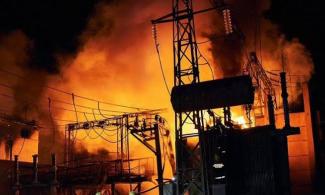
The BBC reports that prosecutors said two people were killed during the attack on Kyiv, while plumes of smoke were seen billowing from around a power station near the Dnipro River.
The latest strikes on Ukraine’s power the Russian forces have reportedly destroyed about 30% of the country’s power stations, leading to massive blackout and stoppage in water circulation in some parts of Ukraine’s capital, Kyiv and other cities.
The BBC reports that prosecutors said two people were killed during the attack on Kyiv, while plumes of smoke were seen billowing from around a power station near the Dnipro River.
Following the strikes, power and water supply were cut in Zhytomyr, west of Kyiv, while two facilities were terribly destroyed in Dnipro.
BBC reports that the latest attacks came 24 hours after Kyiv was hit by "kamikaze" drones.
It was gathered that the unmanned drones, believed to be Iranian-made, killed at least five people in Kyiv and four in the Northern city of Sumy, while it struck critical infrastructure, throwing hundreds of towns and villages into darkness.
The BBC report quoted Ukraine President, Volodymyr Zelensky, saying on Tuesday that in the past eight days, "30% of Ukraine's power stations have been destroyed, causing massive blackouts across the country."
Latest report on the ongoing Russia-Ukraine war indicated that Russia has stepped up attacks in recent weeks on electricity infrastructure in cities away from the front lines.
Although officials have reportedly rushed to repair the damaged electricity infrastructure, the strikes, ahead of winter, have raised concerns about how the system will respond.
Whereas it was not initially clear to what extent drones were involved on Tuesday, Ukraine authority said Russian bombers had fired missiles and one S-300 anti-aircraft missile had hit a residential building in the southern city of Mykolaiv overnight, killing one person. The city's flower market was also destroyed.
Further information on other attacks early on Tuesday showed that in Zhytomyr, the mayor said there was no power or water in the city and hospitals were working on back-up power.
Also, the strikes on a power plant in Kyiv left the Troyeschyna area on the bank of the Dnipro river without electricity and water, hence, power and water supplies were disrupted in the central city of Dnipro where a large energy facility was destroyed.
Officials said street lighting would be turned off, while shelling was reported in the North-Eastern city of Kharkiv, and infrastructure in the southern city of Zaporizhzhia was also hit, but local officials said no-one had been hurt, according to the BBC.
It was further reported that in some cities, Ukrainians are buying power generators and gas burners, while across the country, people have been urged to reduce their energy consumption at peak times. Some towns are already facing rolling blackouts.
Ukrainian MP Lesia Vasylenko told the BBC that "We were expecting that Russia will intensify attacks on energy infrastructure and civilian infrastructure and increase the urban warfare towards autumn and here we are exactly with that scenario taking place.”
UK defence intelligence in its latest assessment noted that it was highly likely that Russia had become increasingly willing to strike civilian infrastructure in addition to military targets since its setbacks on the battlefield in recent weeks.
Russia's missile and drone attacks have brought renewed calls from the Ukrainian government for the delivery of air defence missiles.
Recall that the US earlier said it agreed with its French and UK allies that the supply of drones by Iran violated a UN Security Council resolution linked to a nuclear agreement, barring the transfer of certain military technology.
Ukraine has identified the drones used in deadly attacks on Kyiv and Sumy as Shahed-136 unmanned aerial vehicles (UAVs).
Vedant Patel of the US state department said the US would not hesitate to use sanctions.
Meanwhile, Russia and Iran have denied that Iranian drones have been deployed, but the EU said it is gathering evidence and is ready to act.